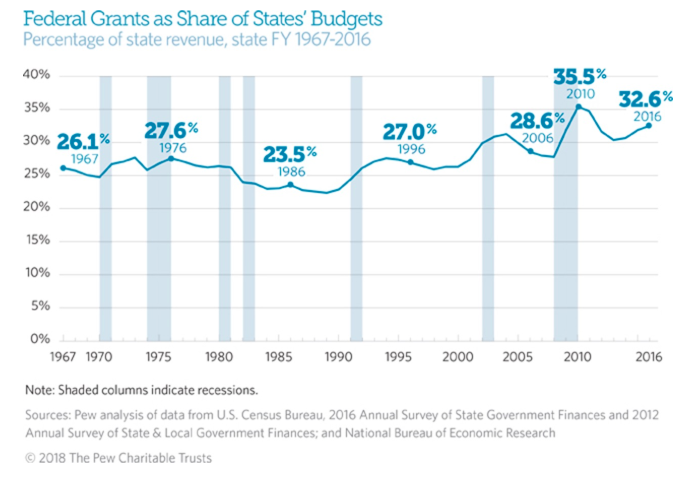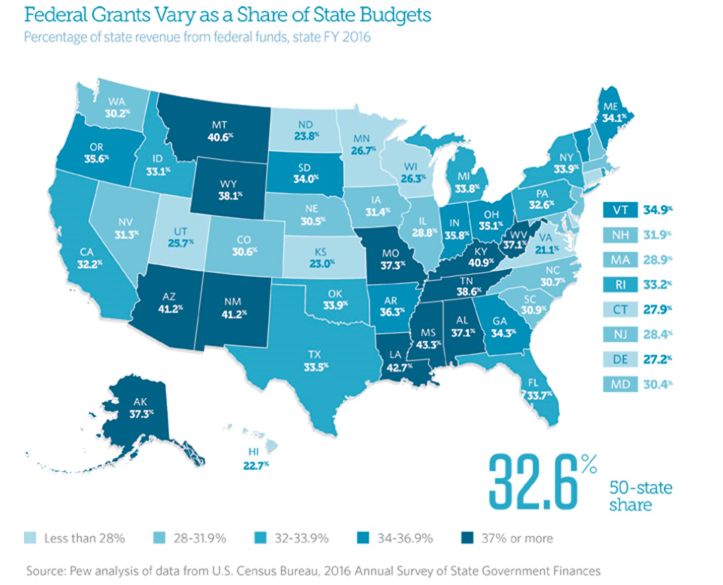Connecting state and local government leaders
A majority of states saw gains in federal dollars as a share of state revenue in fiscal 2016.
This analysis, originally published by The Pew Charitable Trusts, was written by Anne Stauffer, Laura Pontari and Brakeyshia Samms.
The share of states’ revenue made up by federal dollars rose in fiscal year 2016 for the third year in a row, largely because of growth in Medicaid grants to states. The federal government provided 32.6 percent of 50-state revenue in fiscal 2016—the third-largest share on record—up from 31.9 percent in fiscal 2015.
A majority of states—30—saw gains in federal dollars as a share of state revenue in fiscal 2016. Health care grants have been the main driver of increases in federal funding to states in recent years, with Medicaid alone accounting for two-thirds of federal grants to states. In addition to federal funds, states receive income from taxes and other sources, such as public university tuition, tolls, and lottery receipts.
Federal grants to states rose 5.3 percent in fiscal 2016, outpacing overall revenue growth of 3 percent. The $31 billion increase in federal funds boosted the share of state revenue coming from the U.S. government to its third-highest level since at least 1961, the first year of comparable data for all 50 states. The only two larger shares occurred right after the Great Recession, when a temporary influx of U.S. economic stimulus dollars and falling state tax revenue led to the federal share of states’ revenue reaching 35.5 percent in fiscal 2010 and 34.7 percent in fiscal 2011. The share in fiscal 2016 captured the enhanced federal support states received for expanding Medicaid health coverage eligibility under the Affordable Care Act (ACA), as well as other growth in the health care program.

Federal funds for the Medicaid expansion became available as of Jan. 1, 2014, and under the Medicaid provisions in the ACA, the federal government reimbursed states for all costs to extend health coverage to newly eligible low-income adults through calendar 2016, with its portion gradually dropping to 90 percent by calendar 2020. In fiscal 2016, three states—Indiana, New Hampshire, and Pennsylvania—received their first full year of grants, Alaska and Montana started midway through the year, and 25 states received their second full year of expanded Medicaid grants. Nationally, enrollment in Medicaid increased 3.8 percent over the previous year.
The fiscal 2016 share was 2.7 percentage points higher than the 20-year average of 29.9 percent and more than 7 points greater than the previous 20-year average of 25.0 percent from 1977 to 1996, based on rounded data.

The federal share of state revenue reflects how much funding states receive from the federal government to help pay for public services such as health care, education and training, transportation, and other infrastructure. (See “Federal Spending Decisions Affect State Budgets.”) The indicator measures the combined effects of swings in state and federal funds. Changes in either revenue source affect the ratio of federal to total dollars. A higher or lower percentage does not necessarily indicate a problem for state budgets. Understanding the differences among states can help policymakers make more informed decisions when debating changes to federal funding.
State highlights
Federal shares vary across the country. Fiscal 2016 data show:
- Of the 30 states that recorded a year-over-year gain in the federal share of their revenue, 20 were Medicaid expansion states.
- The percentage of state revenue from federal funds was roughly twice as great in Mississippi (43.3 percent), Louisiana (42.7 percent), and Arizona and New Mexico (41.2 percent each)—the states where federal shares were highest—as in Virginia (21.1 percent), Hawaii (22.7 percent), and Kansas (23.0 percent)—the states where the shares were lowest.
- In fiscal 2016, North Dakota had the biggest percentage-point gain in the federal share of state revenue, up 5.4 points from the previous year, as the state’s total revenue fell faster than its federal dollars. The next-biggest increases were in Wyoming (4.6 points), West Virginia (3.5 points), Alaska (3.0 points), and Indiana (2.7 points). The state with the steepest decline was Oregon, at 3.5 points. The next-biggest drops were in Wisconsin (1.2 points), Kansas, North Carolina, South Carolina, South Dakota, and Utah (1.1 points each).
- Compared with their 20-year averages through 2016, only eight states received a smaller percentage of their revenue from the federal government in fiscal 2016. The biggest difference was in North Dakota, where an oil boom drove general revenue increases. The federal share of its revenue averaged 29.2 percent over the past 20 years, but was 5.4 percentage points below that level in fiscal 2016. The next-biggest decreases were in South Dakota (4.6 points), and Kansas (4.5 points).
- Of the 42 states that received a greater portion of their revenue from the federal government in 2016 than their 20-year averages, Alaska had the largest increase—13.3 percentage points. In recent years, its total revenue has tumbled as weak energy prices hit tax collections in the commodity-dependent state. The next-biggest increases were in Nevada (8.9 points), Arizona (7.5 points), and New Mexico (7.4 points).

Federal dollars remained the second-largest source of states’ revenue in fiscal 2016, accounting for about $622 billion, or about a third of the $1.91 trillion collected by state governments. Tax collections are states’ leading revenue generator and reached $923 billion in fiscal 2016, up from $912 billion in fiscal 2015.
Download the data to see individual state trends. Visit Pew’s interactive resource Fiscal 50: State Trends and Analysis to sort and analyze data for other indicators of state fiscal health.

NEXT STORY: The States Where Unemployment Exceeded the National Rate in June



